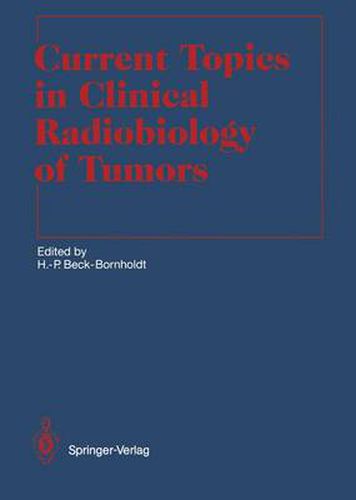Readings Newsletter
Become a Readings Member to make your shopping experience even easier.
Sign in or sign up for free!
You’re not far away from qualifying for FREE standard shipping within Australia
You’ve qualified for FREE standard shipping within Australia
The cart is loading…






The impact of basic science radiobiological research is now being recognized of significant importance in clinical radiation oncology. Observations made in the laboratory using animals as'well as tissue culture have led to a better biologic understanding of techniques for altered fractionation, techniques for measuring tumor cell proliferation, the possi bilities and limitations of methods for evaluation of nonrandomized clinical studies in deriving time dose relationships for human tumors as well as a better understanding of repair kinetics in mammalian cells, fractionation sensitivity and the major impact oftechnologies to improve local/regional control with the subsequent impact on survival. These findings have led to changes in treatment schedules and have led to further close cooperation among the radiation oncologists and radiation biologists. Well support research efforts in radiation biology have a major and significant impact on the clinical care of the cancer patient. Studies that originated in the laboratory are now finding their way into clinical practice resulting in better local and regional control and improved number of patients surviving without disease.
$9.00 standard shipping within Australia
FREE standard shipping within Australia for orders over $100.00
Express & International shipping calculated at checkout
The impact of basic science radiobiological research is now being recognized of significant importance in clinical radiation oncology. Observations made in the laboratory using animals as'well as tissue culture have led to a better biologic understanding of techniques for altered fractionation, techniques for measuring tumor cell proliferation, the possi bilities and limitations of methods for evaluation of nonrandomized clinical studies in deriving time dose relationships for human tumors as well as a better understanding of repair kinetics in mammalian cells, fractionation sensitivity and the major impact oftechnologies to improve local/regional control with the subsequent impact on survival. These findings have led to changes in treatment schedules and have led to further close cooperation among the radiation oncologists and radiation biologists. Well support research efforts in radiation biology have a major and significant impact on the clinical care of the cancer patient. Studies that originated in the laboratory are now finding their way into clinical practice resulting in better local and regional control and improved number of patients surviving without disease.